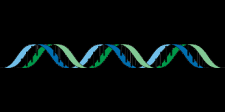What It Means To Be Human Is Changing Thanks To Gene Editing
By Joe Matthews (Zócalo Public Square),
Huffington Post
| 05. 27. 2016
Near the end of a wide-ranging conversation about the complexity of the human genome and the history and future of genetics, Arizona State University President Michael Crow noted the almost inconceivably large number — “10 to the 14th” power — of microorganisms in our bodies. And then he turned to cancer researcher Siddhartha Mukherjee and posed what Crow called “a complicated question.”
“What the hell are we?”
Crow and Mukherjee, author of the new book “The Gene: An Intimate History” and the Pulitzer Prize-winning “The Emperor of All Maladies: A Biography of Cancer,” already had spent much of the evening — a Zócalo Public Square event in front of a full house at the Skirball Cultural Center — trying to answer that question.
One answer, said Mukherjee, is “a majestic formula” akin to e=mc102: “Genes plus environment plus genetic interactions plus chance” equals the human form.
But what it means to be human is also changing, he said, both biologically and culturally. Our increasing knowledge and ability to manipulate our genes — the fundamental units of heredity and the basic...
Related Articles
A Review of Exposed by Becky McClain
“Do not get lost in a sea of despair. Be hopeful, be optimistic. Our struggle is not the struggle of a day, a week, a month, or a year, it is the struggle of a lifetime. Never, ever be afraid to make some noise and get in good trouble, necessary trouble.”
— John Lewis
Becky McClain became famous when she successfully sued Pfizer, one of the very largest pharmaceutical and biotech companies. She...
By Katherine Long, Ben Foldy, and Lingling Wei, The Wall Street Journal | 12.13.2025
Inside a closed Los Angeles courtroom, something wasn’t right.
Clerks working for family court Judge Amy Pellman were reviewing routine surrogacy petitions when they spotted an unusual pattern: the same name, again and again.
A Chinese billionaire was seeking parental...
By Sarah Kliff, The New York Times | 12.10.2025
Micah Nerio had known since his early 30s that he wanted to be a father, even if he did not have a partner. He spent a decade saving up to pursue surrogacy, an expensive process where he would create embryos...
By Carter Sherman, The Guardian | 12.08.2025
A huge defense policy bill, revealed by US lawmakers on Sunday, does not include a provision that would have provided broad healthcare coverage for in vitro fertilization (IVF) for active-duty members of the military, despite Donald Trump’s pledge...




